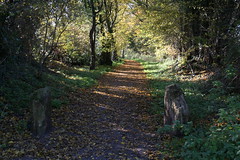A lot of road names commemorate the great or good (Victoria Road, Kingsway). Many provide directions to the next big town (London Road, Bath Road). A few have ancient roots (apparently Watling Street derives from the Old English Wæcelinga Stræt; Fosse Way from from the Latin fossa, meaning ditch).
But out in the countryside, the vast majority of names seem to be functional.
My own theory is that before the gentleman from the Ordnance Survey arrived with his notebook the locals didn't really need to name the different paths through their village. Looking at the common names for a lane on OSM most are either based on an important building (Church Lane, Mill Lane, School Lane, Hall Lane, Rectory Lane,...), or they describe the lane itself (the list of examples like Green Lane, Long Lane, Sandy Lane, Marsh Lane, Water Lane, Broad Lane goes on, and on).
I imagine the surveyor turning up in the pub, putting down his top hat, and asking "what do you call that path, and what do you call that one?" and the ancestors of Eddie Grundy and his mates getting their heads together to think up some suitable names.
"Well that one's stony, and that one goes to the windmill, and the parson wouldn't be happy if we told him what we really call that one, so I suggest we tell him it's called Love Lane". "G'evening your lordship, I'm just telling old Amos here that we ought to name one of these paths after your lovely daughter Holly, who does so much for the poor folk of the parish. That would be very kind sir, I'll just have a pint please."
I've put a list here of the common names for a lane on OSM, ranked by the number of segments and total length.

8 comments:
Well at least they are not named 1st Street, 2nd Street and so on. (With Main Street being the pinnacle of imagination)
(Kindly borrowd from the "Big Bang Theory" Tv Show)
Aha, but "The Street" ranks as the 13th most common name in the UK on OSM:
1 Station Road
2 High Street
3 London Road
4 Church Road
5 Church Lane
6 Main Street
7 Mill Lane
8 New Road
9 Green Lane
10 Church Street
11 Park Road
12 Main Road
13 The Street
14 Park Lane
15 School Lane
16 Victoria Road
17 Watling Street
18 Mill Road
19 Long Lane
20 Sandy Lane
I find your theory a very appealing thought. However, I cannot imagine the locals would never have had to refer to a particular lane when talking to each other before the OS man turned up. It is also quite easy to imagine names such as Mill Lane coming about through generations of normal conversation, even if they were perhaps a bit variable ("Mill Lane", "The Mill Lane", "Mills Lane", etc.). I suppose there might have been one or two without names. OTOH I suspect your account of Love Lane theory is right on the mark!
You'll probably find most of the names in documents from the seventeenth or eighteenth centuries - magistrates papers for example.
All of them should (in England and Wales be on the Tithe Commutation maps from the 1830s.
Some will be on saxon charters which work like turn by turn routing (along Watling street to the Hoar Oak, turn along stony way, then along foul way and past the old midden...).
The funny ones are the Welsh versions (why are so many rivers called Avon - the saxons asked a local person what the river was called, who replied "a river (afon)". Bredon Hill in Worcestershire is Hill Hill Hill (Welsh Bre, Early anglo-saxon Dun, plus Hill).
Thanks all. Those Saxon documents ring true, because that's just how we give directions. I was in the barber's the other day, and somebody asked for directions. "Up there, turn right at the hospital, it's a bit of a wiggly road, but go past the cemetery, then it's on your right". Or helping my brother-in-law find the motorway: "down the hill, turn right, through the traffic lights, and along the dual carriageway, and follow the signs". Not a single road name.
Re: Bredon Hill - I've heard the same about Pendle Hill in Lancashire.
Brian Friel's play 'Translations' is an enjoyable take on the subject when an Ordnance Survey cartographer turns up in village Ireland. Worth reading.
There's a "Real Names Map" which translates names into modern english e.g. I think it's more a curiosity than unimpeachable scholarship, but still neat.
There's some clips of the UK map here:
http://www.telegraph.co.uk/travel/3548315/Bizarre-new-atlas-comes-to-the-Great-Land-of-the-Tattooed.html
Post a Comment